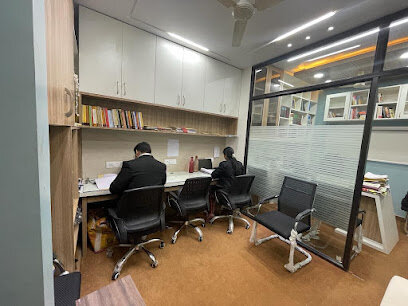Best Conveyancing Lawyers in Jaipur
Share your needs with us, get contacted by law firms.
Free. Takes 2 min.
Free Guide to Hiring a Real Estate Lawyer
List of the best lawyers in Jaipur, India
About Conveyancing Law in Jaipur, India
Conveyancing is the legal process of transferring ownership of property from one person to another. In Jaipur, as in the rest of India, conveyancing involves a series of steps designed to ensure that the ownership transfer is lawful, transparent, and recognized by the authorities. This process typically includes drafting and executing the sale agreement, verifying property titles, paying applicable stamp duties and registration fees, and completing formal registration with the local land records office. Proper conveyancing safeguards both buyers and sellers, reduces the risk of future disputes, and ensures a clear title to property.
Why You May Need a Lawyer
While some property transactions may appear straightforward, there are many circumstances in which legal assistance becomes essential. You may need a lawyer if:
- You are buying or selling property for the first time and are unfamiliar with local rules and documentation.
- The property has a complex ownership history or unclear title, requiring detailed due diligence.
- There is a dispute about boundaries, inheritance, or previous ownership.
- You are entering into a joint ownership or partnership agreement for real estate.
- There are legal notices or litigation associated with the property.
- You wish to ensure that all applicable taxes, stamp duties, and registration fees are properly calculated and paid.
- You need to draft or review legal documents such as sale agreements, power of attorney, or transfer deeds.
Local Laws Overview
Conveyancing in Jaipur is governed by a mix of central and state legislation, local bylaws, and procedural guidelines. Some of the key aspects include:
- Registration Act, 1908: All property transfers must be registered with the local Sub-Registrar's Office to be legally effective in Jaipur.
- Indian Stamp Act, 1899 and Rajasthan Stamp Law: Stamp duty must be paid on the sale, gift, or transfer of property based on the registration value or the circle rate set by local authorities.
- Transfer of Property Act, 1882: Governs how properties can be legally transferred between parties.
- Rajasthan Urban Improvement Act and Jaipur Development Authority Regulations: Certain properties within Jaipur under development authority jurisdiction may have additional compliance and zoning restrictions.
- Land Titles and Records: It is critical to verify “khata” records, previous registration documents, and obtain a no-dues or encumbrance certificate to ensure a clear title.
- Mutation Process: After registration, mutation in municipal records is required to reflect the new owner's name for property tax and government records.
Frequently Asked Questions
What is the process of buying or selling property in Jaipur?
The process involves verifying the property title, drafting a sale agreement, executing and registering the sale deed at the Sub-Registrar's Office, paying stamp duty, and updating municipal and land records through mutation.
Which documents need to be verified before a property transaction?
Essential documents include the title deed, previous sale deeds, encumbrance certificate, property tax receipts, approved building plan, and identity/address proof of seller and buyer.
How is stamp duty calculated in Jaipur?
Stamp duty is calculated as a percentage of the property value, either the transaction value or the circle rate set by the government, whichever is higher. Rates may vary depending on the type of transaction and gender of the buyer.
What happens if stamp duty is not paid?
Transactions without proper stamp duty payment are not legally valid. You may also be liable for penalties, interest, or legal disputes in the future.
Is registration of property compulsory?
Yes, registering the transfer deed at the Sub-Registrar's Office is mandatory for property transactions above a certain value. Unregistered documents are not admissible as evidence in court.
What is mutation of property, and why is it important?
Mutation is the process of updating municipal and land records to reflect the new owner's name. It is essential for future transactions, property tax payments, and proof of ownership.
Can I give someone power of attorney to execute a conveyance on my behalf?
Yes, a registered power of attorney allows another person to act on your behalf for property transactions. However, ensure the power of attorney document is specific and properly registered.
How long does the property registration process take?
After executing the sale deed, registration can take a few hours to a couple of days, depending on the workload at the Sub-Registrar's Office. Mutation and updating other records can take several additional weeks.
Are there any restrictions on buying property in Jaipur as a non-resident Indian (NRI)?
NRIs can buy most types of immovable property except agricultural land, plantation property, or farmhouses, subject to adherence to FEMA and state laws. Additional documentation may be required.
What should I do if there is a dispute over property ownership?
Seek legal advice immediately. A conveyancing lawyer can review documents, negotiate a settlement, or file appropriate legal proceedings to protect your interests.
Additional Resources
For more information and assistance, consider reaching out to:
- Registrar/Sub-Registrar Offices: These offices handle registration of property documents in Jaipur and can provide certified copies of registered deeds.
- Jaipur Development Authority (JDA): For properties falling under JDA jurisdiction, visit for information on land use, approvals, and zoning regulations.
- Rajasthan Revenue Board: To verify land records and mutation status.
- State Legal Services Authority: Offers legal aid and resources for those who qualify.
- Private Conveyancing Lawyers and Law Firms: Experienced professionals in Jaipur can assist with document drafting, due diligence, and all legal formalities.
Next Steps
If you need legal assistance in conveyancing in Jaipur, consider the following steps:
- Gather all documents related to your property transaction, including title deeds, ID proofs, and prior agreements.
- Consult with a local conveyancing lawyer to review your documents and understand your legal position.
- Let your lawyer conduct a thorough due diligence check on the property title and past transactions.
- Ensure that all agreements, deeds, and powers of attorney are drafted or reviewed by your lawyer.
- Attend the Sub-Registrar's Office for registration with all required documentation and witnesses, as advised by your lawyer.
- After registration, ensure mutation and updating of municipal and revenue records to complete the ownership transfer.
- If you face disputes or complexities, do not sign any documents or make payments without consulting your lawyer.
Lawzana helps you find the best lawyers and law firms in Jaipur through a curated and pre-screened list of qualified legal professionals. Our platform offers rankings and detailed profiles of attorneys and law firms, allowing you to compare based on practice areas, including Conveyancing, experience, and client feedback.
Each profile includes a description of the firm's areas of practice, client reviews, team members and partners, year of establishment, spoken languages, office locations, contact information, social media presence, and any published articles or resources. Most firms on our platform speak English and are experienced in both local and international legal matters.
Get a quote from top-rated law firms in Jaipur, India — quickly, securely, and without unnecessary hassle.
Disclaimer:
The information provided on this page is for general informational purposes only and does not constitute legal advice. While we strive to ensure the accuracy and relevance of the content, legal information may change over time, and interpretations of the law can vary. You should always consult with a qualified legal professional for advice specific to your situation.
We disclaim all liability for actions taken or not taken based on the content of this page. If you believe any information is incorrect or outdated, please contact us, and we will review and update it where appropriate.














